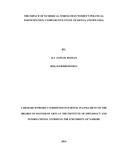| dc.contributor.author | Ali, Zainab H | |
| dc.date.accessioned | 2014-11-20T07:39:46Z | |
| dc.date.available | 2014-11-20T07:39:46Z | |
| dc.date.issued | 2014 | |
| dc.identifier.citation | Degree Of Master Of Arts In Diplomacy And International Studies, University Of Nairobi, 2014 | en_US |
| dc.identifier.uri | http://hdl.handle.net/11295/75033 | |
| dc.description.abstract | There is a robust realization that since women constitutes slightly more than half of the world
population their contribution to the societal and economic development of societies is also
more than half as compared to that of men by virtue of their dual roles in the productive and
reproductive spheres. This study sought to investigate the impact of numerical strength in
women’s political participation with a comparative study of Kenya and Rwanda with the
following objectives: investigating the barriers to women participation in party and electoral
politics, analyzing the institutions that have been employed as a way to increase women
political participation and establishing the contribution of political participation of women to
national policy and democracy. This study used secondary data in analyzing the variables.
The study used secondary data in the form of documented information from libraries and
other relevant institutions. The findings from these secondary data were analyzed through
content analysis. This study found that the critical role played by women leadership in
championing the cause of promoting gender equity and equality in Kenya and Rwanda as a
result of their numerical strength cannot be underestimated despites the challenges they have
faced in political presentation. | en_US |
| dc.language.iso | en | en_US |
| dc.publisher | University of Nairobi | en_US |
| dc.title | The impact of numerical strength in women’s political Participation: comparative study of Kenya and Rwanda | en_US |
| dc.type | Thesis | en_US |
| dc.type.material | en_US | en_US |

